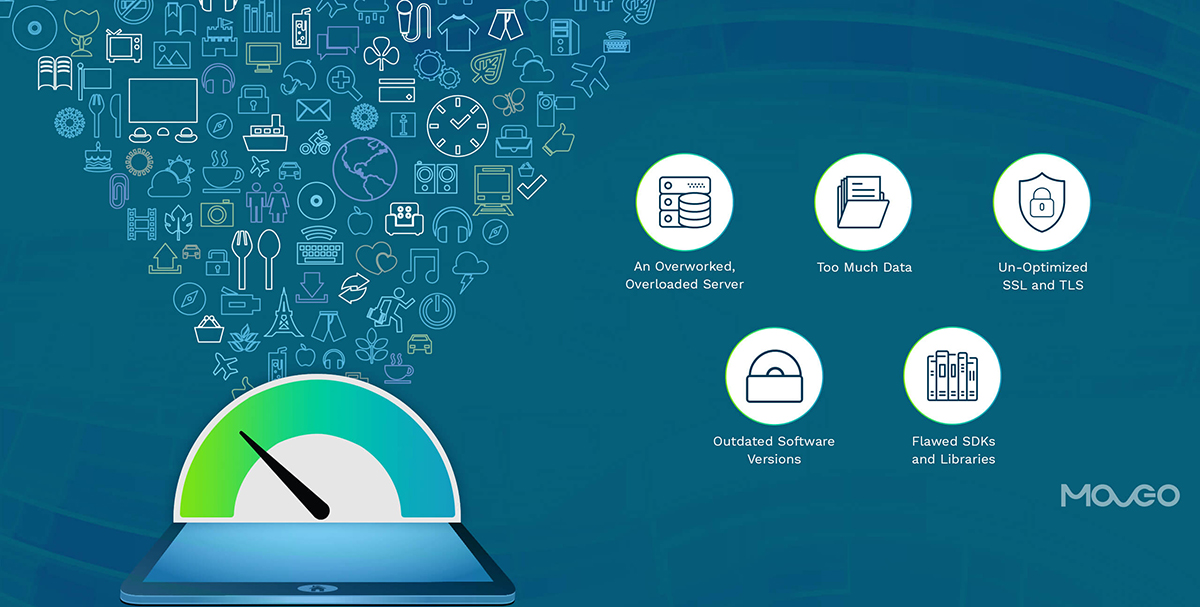For each extra second your page takes to load, your conversion rate drops 7%. Making sure your app loads fast is undoubtedly one of your first priorities as an app developer. To do that, however you must first understand what the common culprits are that tend to slow down apps. So here’s a list of the common reasons our developers have identified over time, that cause mobile apps to slow down. If you are having issues with getting your app to load up super quick and get the users engaged spontaneously, get sifting through your code to see if you are running into one of these issues, and then, well, fix it. So let’s dive right in and check out the top 5 reasons your app may be slowing down:
1. An Overworked, Overloaded Server
So, what is your server doing while the user is waiting to get the app up and running? It is running application code, accessing files from disk, switching between a bunch of tasks and interacting with thousands of other users. With so much going on, your server is overloaded. It could be running out of memory and taking too long to process requests. In turn, it makes a number of requests wait their turn before being able to process them.
The Solution: Adding a Reverse Proxy Server.
Taking some load off your server could help make it work faster and process more requests. Adding a reverse proxy server lets you offload some of the tasks a server has to carry out. A reverse proxy server is directly connected to the internet, allowing it to sit in the front of the machine and handle internal traffic. This enables it to communicate with the application server over a much faster internal network. This frees up the application server to build pages and pass them on to the reverse proxy server, which can in turn, wait on the users and pass on the readily available pages, without any delay. This way, the application can run at benchmark speeds and really ace the speedometers of app performance.
To take things a step further, you can go ahead and add a load balancer that helps distribute traffic and make the application server’s job even easier.
2. Too Much Data
This one’s a bit of a no-brainer – if your app has too much data, it is going to slow your app down. The more your servers have to load, the longer they will take. But this does not mean that you can simply chomp down on the data and make your app leaner by sacrificing rich features.
The Solution: Data Compression
Always compress your data. From sounds to rich graphics and video content, compressing data can make it faster to load without compromising on the aesthetics of functionality. Compression can have a dramatic effect on accelerating the app’s speed. The important thing is to use the right compression standards as suitable for different components such as images, videos or music. You can check out a super helpful resource from Apple right here.
3. Un-Optimized SSL and TLS
Secure Sockets Layer and Transport Security Layer are an integral part of application security and hence, almost impossible to avoid. They encrypt the data while it is in transit from the origin to the server. In fact, Google deems the presence of SSL/TLS as a positive attribute. However, all the good things aren’t without their share of bad.
SSL and TLS certainly affect the performance of your app and slow it down considerably. This is mainly because of two reasons. One is that every time a new connection is opened, an initial handshake is required, which hits the speed. Secondly, there is a consequent ongoing overhead that comes with encrypting the data while on the server and then decrypting it on the client-side.
The Solution: Optimize SSL/TLS
A lot can be done to minimize the overhead from SSL and TLS. Implementing HTTP/2 and SPDY ensure that the browsers need just one connection per session. This results in the app requiring just one handshake, thus dramatically reducing SSL overhead. There are other options like using OpenSSL, session caching, OCSP Stapling and Session Tickets.
4. Outdated Software Versions
If your application is running on older versions of software and frameworks, or if you haven’t updated to newer versions in a while, you will encounter a drop in performance over time. Older software cannot leverage the newer capabilities like new compiler optimizations, increased enhancements and more adoption and support from the community.
The solution: Upgrade to the latest version of the software
Take a good look at your software stack and single out any software that hasn’t been updated to its latest version. New versions have enhanced capabilities and higher compatibilities. They offer a far superior stability and performance. From better tuning optimizations to security alerts and bug fixes, new versions offer a plethora of enrichments that can instantly boost your app speed and performance.
5. Flawed SDKs and Libraries
Even after you have taken every care to ensure optimal application performance, problems may arise from the sources you least expected. While SDKs and libraries are an absolutely integral part of the app development process, you simply cannot take their safety for granted. Third-party libraries are still code, and code can have flaws, bugs and dependencies. Using a library without thoroughly checking it can lead to the problems in them affecting your application and slowing it down. Worse still is the probability of a bag passing on to your app, sending you into a scramble to figure out the problem.
The Solution: Check Your Third-Party Libraries and SDKs Thoroughly Before Introducing Them to Your Application
Always use libraries that have a track record of reputation, stability and security. Be sure to check and recheck before implementing them and choose ones that have a large and actively engaged community.
Wrapping Up
The above list is certainly not an exhaustive one, but it gives a great primer on spotting issues that cause application performances to slow down. The idea is to do away with anything that gets in the way of users and swift app performances. There aren’t any problems that cannot be solved. Be sure to adopt the fixes suggested above to dramatically improve your app’s speed and performance. If you are finding it difficult to pin down the reason and fix the problem, drop us a line and let’s fix it for you.
Hate slow apps?
So do we. That’s why we build apps with the highest quality code and abundant resources so that your apps are fast, spontaneous and a hit with the users. Schedule a free consultation today to keep your app and your business in the fast lane.



Mobile apps are very important part of the life nowdays. if that mobile apps are slow then it makes very wrong impression. to avoid that you have listed the reasons for that mobile application. Thank you so much for sharing.